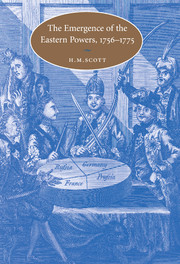Book contents
- Frontmatter
- Contents
- List of maps and genealogical table
- Acknowledgements
- A note on dates and place names
- List of abbreviations
- Introduction: the eighteenth-century European states system and its transformations
- 1 The rise of the eastern powers
- 2 The Seven Years War and the European states system
- 3 The domestic legacies of the Seven Years War
- 4 The stabilisation of Europe, 1763–1766
- 5 Diplomacy and the eastern powers
- 6 From peace to war, 1766–1768
- 7 The partition of Europe, 1768–1772
- 8 The advance of Russia, 1772–1775
- Conclusion: Russia and the emergence of the eastern powers
- Bibliography
- Index
- CAMBRIDGE STUDIES IN EARLY MODERN HISTORY
8 - The advance of Russia, 1772–1775
Published online by Cambridge University Press: 16 July 2009
- Frontmatter
- Contents
- List of maps and genealogical table
- Acknowledgements
- A note on dates and place names
- List of abbreviations
- Introduction: the eighteenth-century European states system and its transformations
- 1 The rise of the eastern powers
- 2 The Seven Years War and the European states system
- 3 The domestic legacies of the Seven Years War
- 4 The stabilisation of Europe, 1763–1766
- 5 Diplomacy and the eastern powers
- 6 From peace to war, 1766–1768
- 7 The partition of Europe, 1768–1772
- 8 The advance of Russia, 1772–1775
- Conclusion: Russia and the emergence of the eastern powers
- Bibliography
- Index
- CAMBRIDGE STUDIES IN EARLY MODERN HISTORY
Summary
Russia's involvement in partition had revealed not merely her territorial ambitions, but also her inability to resist Austrian and Prussian pressure. Sole control seemed to have been given up in exchange for shared domination over Poland exercised jointly with the two German powers. This was in keeping with Catherine II's considerable and mounting problems during the first half of the 1770s. Though important victories had been won over the Ottoman empire, St Petersburg seemed unable to secure its peace terms, while it was recognised that imposing the territorial seizures upon Poland might prove difficult. The burdens of the fighting were considerable and ever increasing. On the eve of the war there had been a cash reserve of eight and a half million rubles, but this had quickly been consumed. By 1771 annual military expenditure had soared to almost twenty-two million rubles: in 1768 it had been twelve and a half, while the small budgetary surplus which had existed in the last year of peace had, by 1772, become an annual deficit of over nine million rubles. The fiscal effort required to support spending on this scale was beyond the capacity of Russia's protean state administration, while foreign credit was soon exhausted.
- Type
- Chapter
- Information
- The Emergence of the Eastern Powers, 1756–1775 , pp. 225 - 248Publisher: Cambridge University PressPrint publication year: 2001

